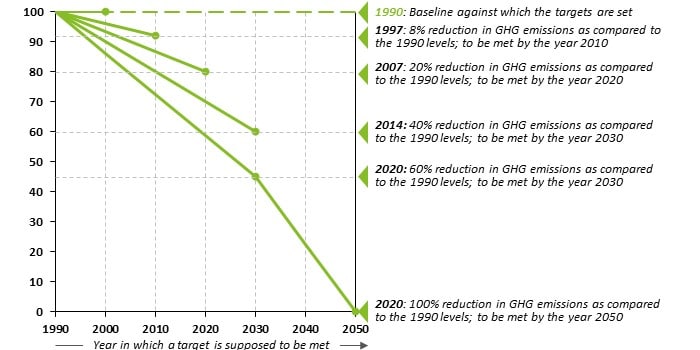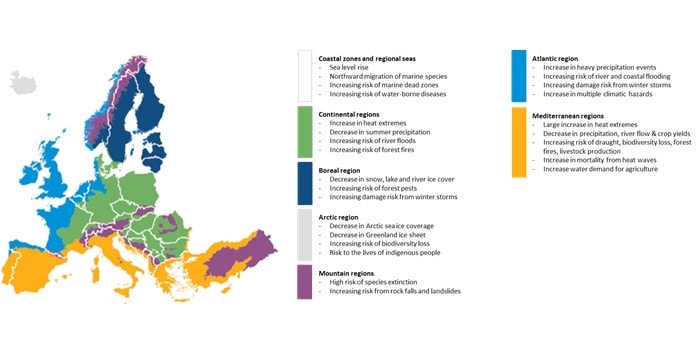The Push for Decarbonization has been saved

Blog
The Push for Decarbonization
The Future of Energy blog series
Stay tuned and fasten your seatbelts, as we maneuver through this fast-paced era of decarbonization. Keep an eye on your feed and engage with us because in this race against climate change, everybody needs to be on board to make an impact that matters.
Authors: Safwan Shurieh, Joris van de Wetering
The push for decarbonization is underpinned by the unprecedented and global impacts of climate change. As highlighted by the 6th IPCC report, the changes are numerous such as intense rainfall, flooding, droughts, sea-level rise, coastal erosion, melting of glaciers and ice sheets, loss of summer Arctic sea ice, heat waves, and ocean acidification [1].
The economic impact and health risks of climate change are also highly significant. The total reported economic losses caused by weather and climate-related extremes, between 1980 – 2017, amounted to approximately 453 billion euros (in 2017 Euro values), and recently, more than 200 medical journals have warned repeatedly that this warming climate could lead to a “catastrophic harm to health that will be impossible to reverse” [3][4].
Due to the severity of the issue, the need for decarbonization is being highlighted and is high up on the European political agenda. This is very evident from the fact that the GHG emission reduction targets set from 1997 to date, are becoming increasingly stringent as compared to the emission levels in 1990. First, parties agreed to reduce GHG emissions by 8% by 2010; followed by 20% by 2020, then 40% and 60% by 2030. More recently, this urgency has led parties to agree upon a 100% reduction in GHG emission levels to be achieved by 2050 (see figure 2).
The proactiveness of the scientific society in gathering evidence, coupled with agreements and legislation packages being announced in quick succession, also indicate the urge to decarbonize. Taking into account the publications by the Club of Rome, the commission of Brundtland, the Rio summit, the Kyoto protocol, the European green deal and Fit for 55, the UN Climate Change Conference of the Parties (COP26) in Glasgow, plus various other global and local commitments, it cannot be denied that the pace and push for decarbonization is being strongly accelerated.

Looking at the developments so far, the drive for decarbonization is apparent and the ambition is clear, but what about the actual transition that is needed? Tackling the issue of climate change not only requires goals but also demands collaborative action and systemic change. It requires us to move from technology solutions (e.g., renewables) to a holistic systems perspective, and from single products (e.g., electric cars) to sustainable green value chains (e.g., green cars made from green steel).
However, such a transition is not simple and brings with it quite a few challenges. These challenges include but are not limited to: (i) integration of the increasing share of intermittent renewable energy within the energy system; (ii) providing green molecules to sectors that are hard to electrify; (iii) getting carbon accounting right (biomass / CCU / certification / nature-based solutions); (iv) providing financial solutions that enable the energy transition to move forward; (v) setting the right tax incentives to accelerate the transition; (vi) keeping decarbonization, affordability and energy security in balance during the transition; and (vii) using the power of merger and acquisition to futureproof companies into a renewable world.
With this in mind, we aim to shed light on some of these challenges, and share our views through a Future of Energy blog series on the following topics: Hydrogen: Mind the Supply Gap, Configuring the Hydrogen Supply System, Import Dependency will Increase, Decarbonizing Mobility, Future of Energy and M&A, and more. We also aim to bring in interesting perspectives and content by engaging in dialogue with experts through interviews and podcasts.
So stay tuned and fasten your seatbelts, as we maneuver through this fast-paced era of decarbonization. Keep an eye on your feed and engage with us because in this race against climate change, everybody needs to be on board to make an impact that matters.
Future of Energy Insights
Would you like to stay up-to-date on the energy transition and be the first to receive our Future of Energy insights? Fill in the form below.
Recommendations
Will hydrogen be the surprise of this decade?
The potential of hydrogen will play an important role in the energy transition



